



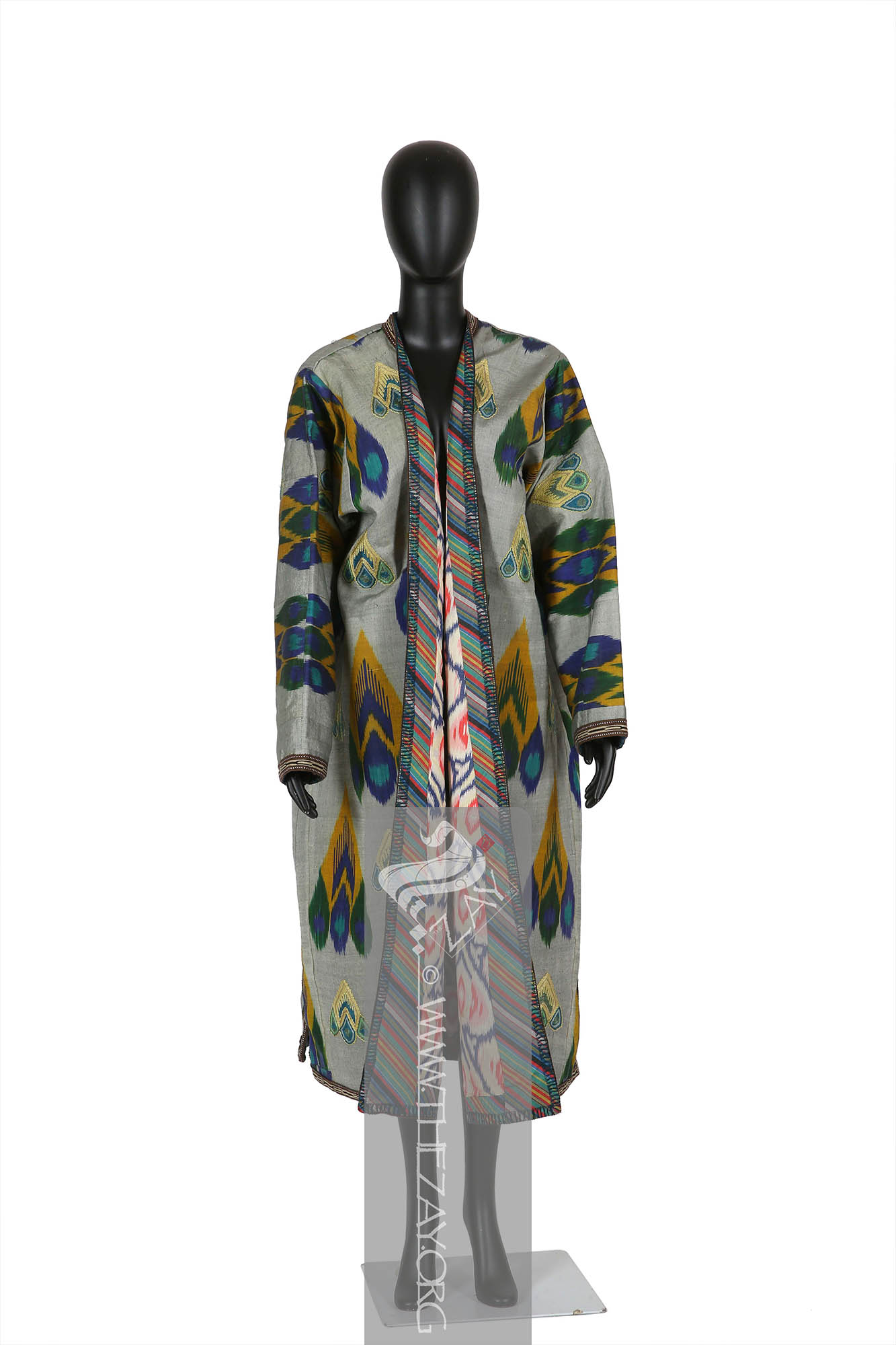
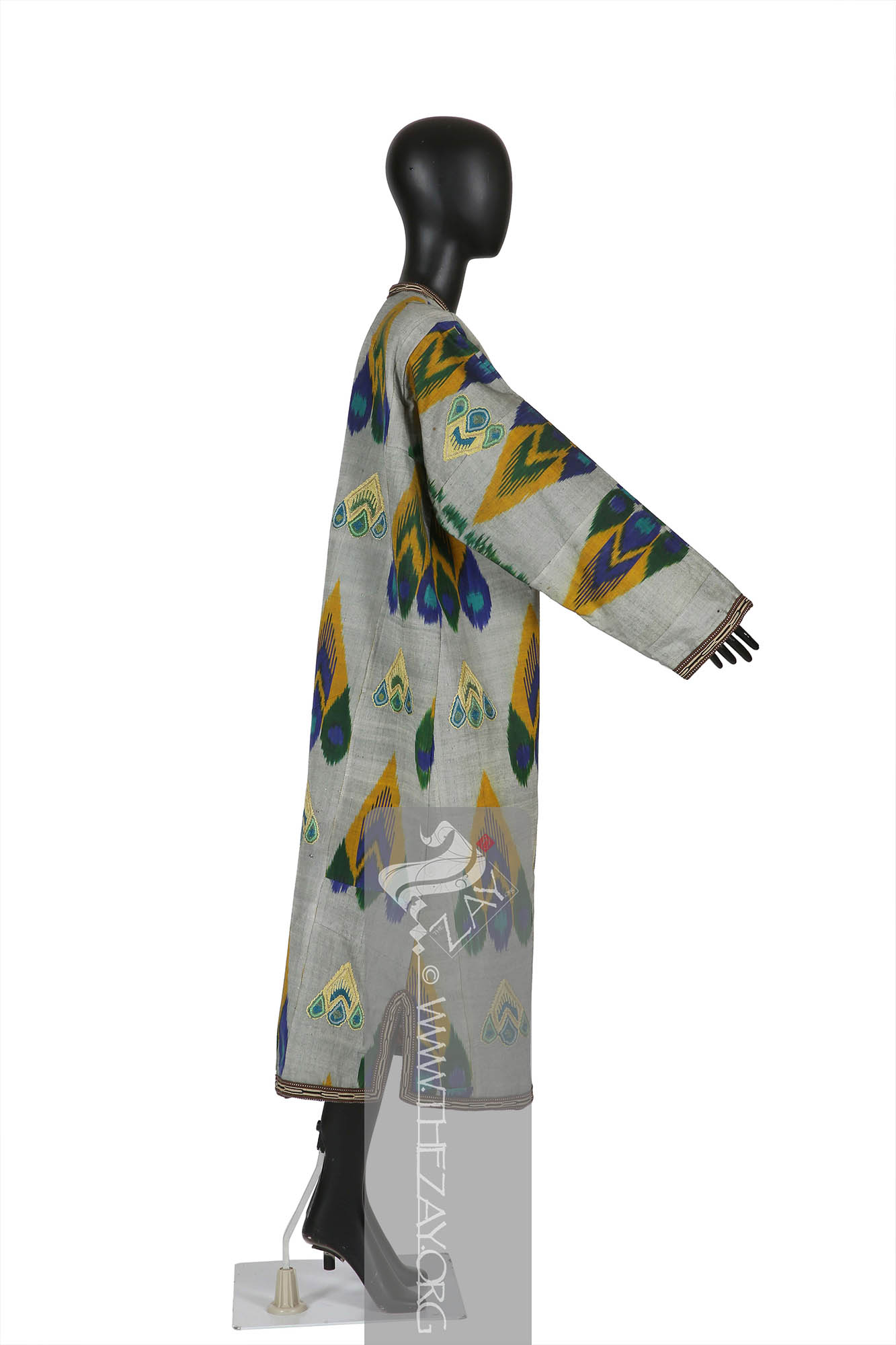
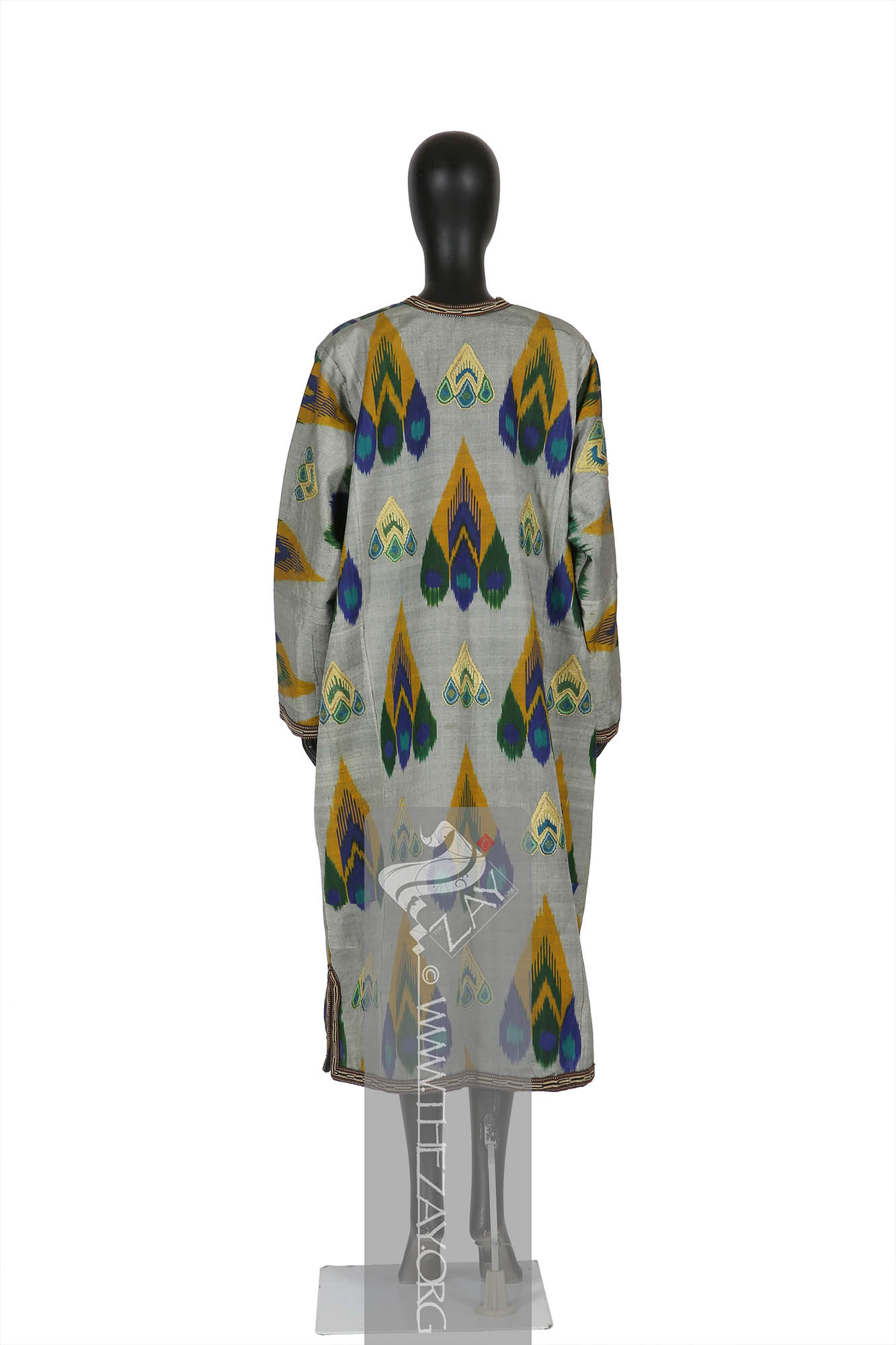
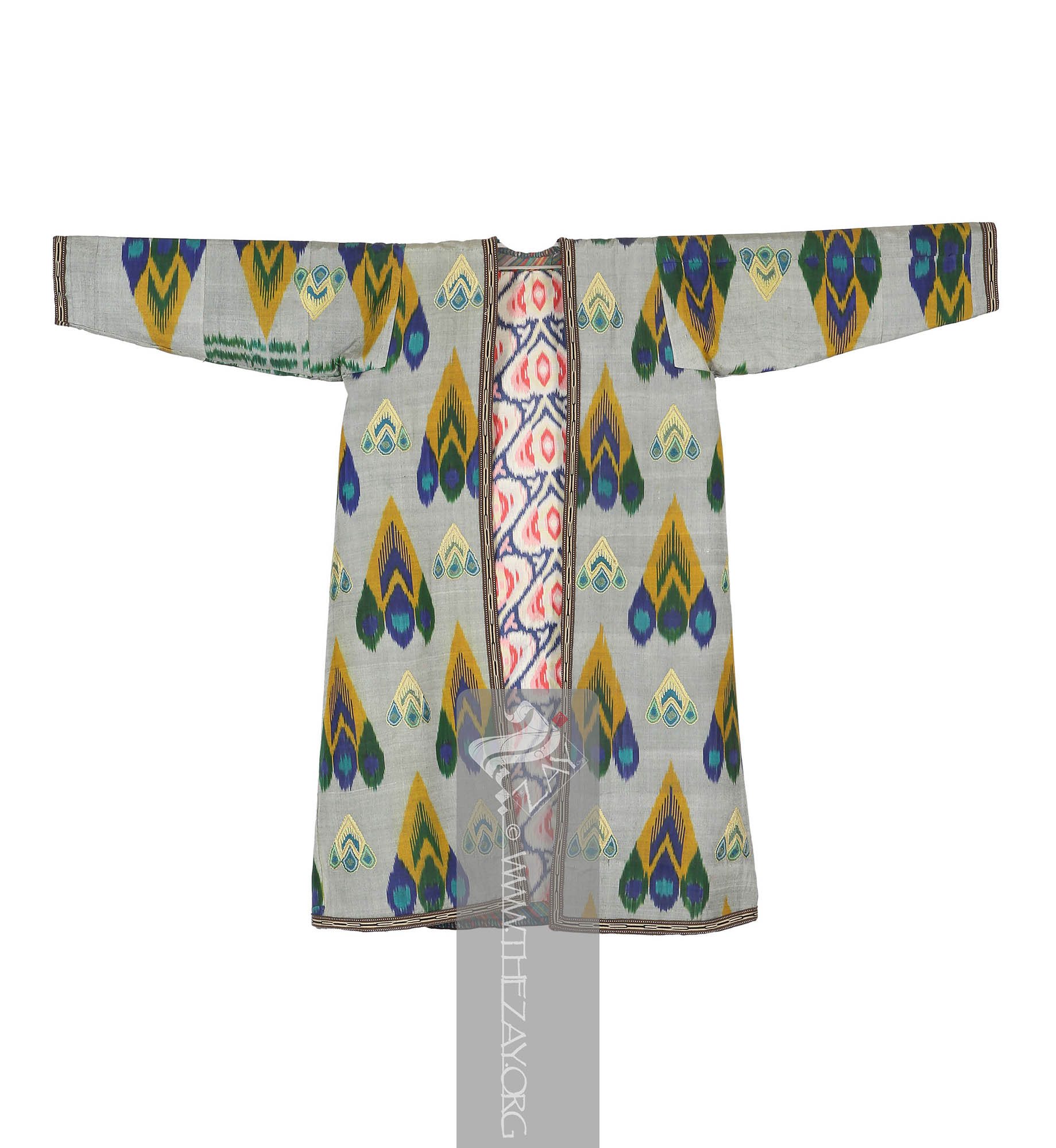
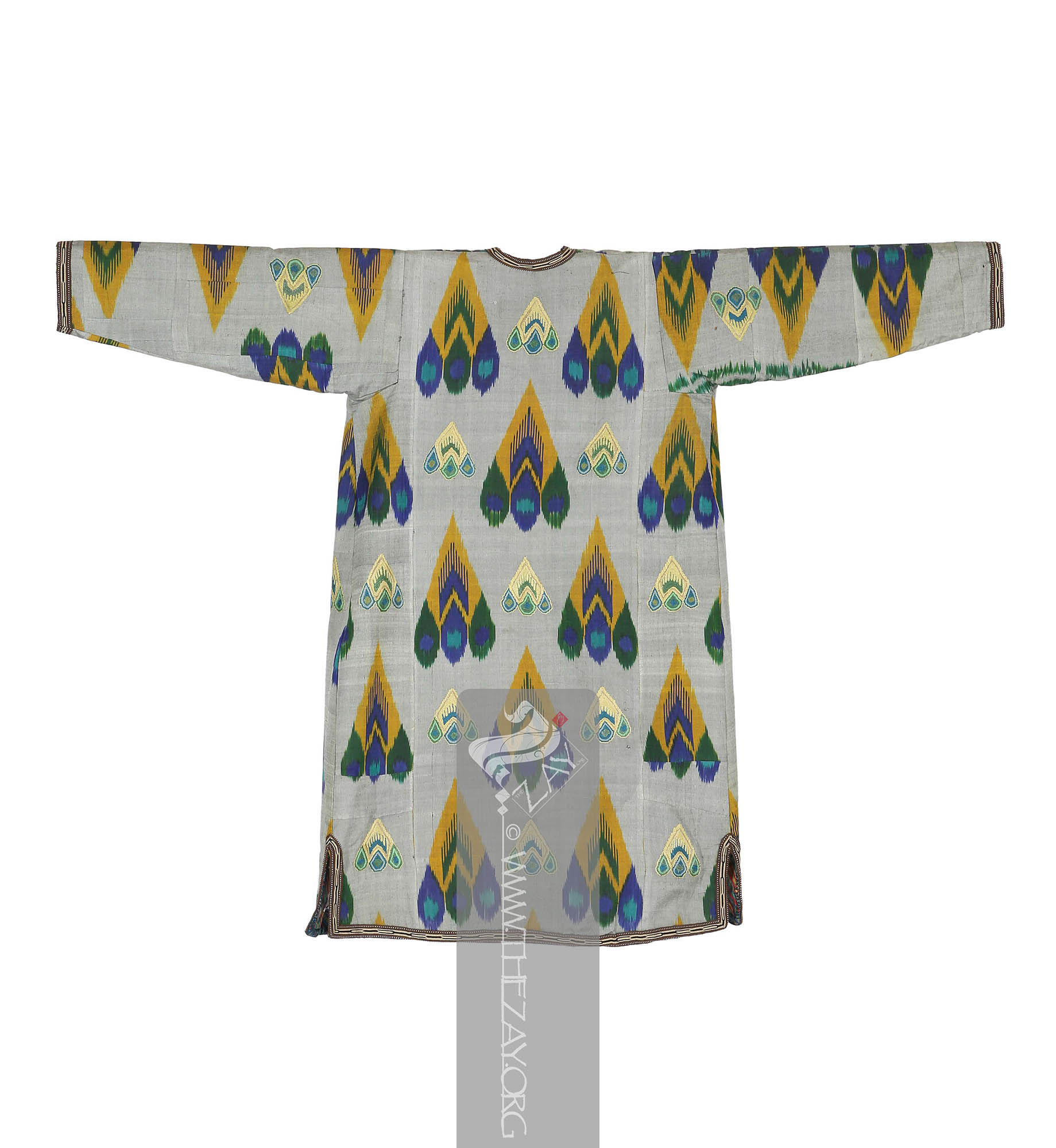
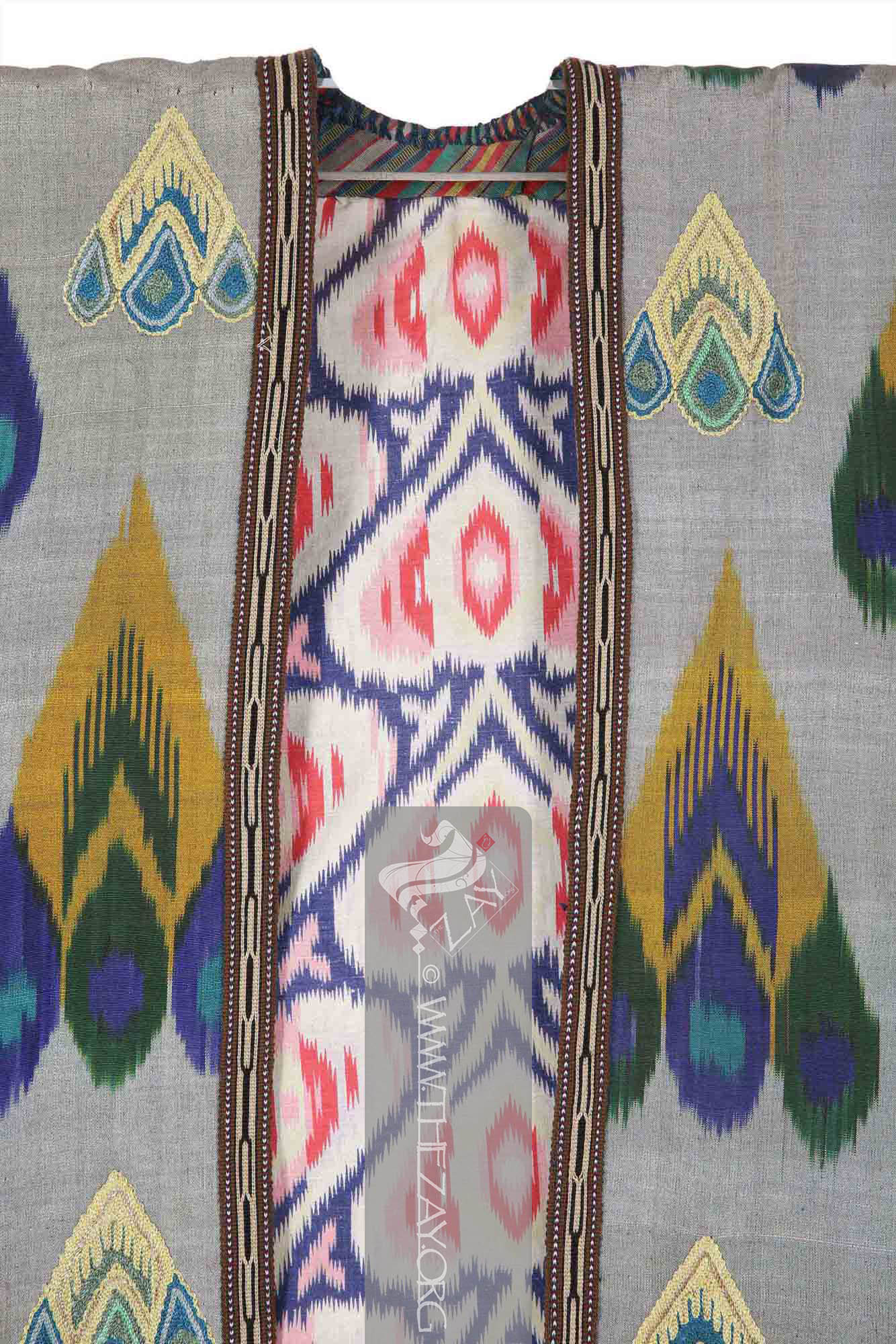
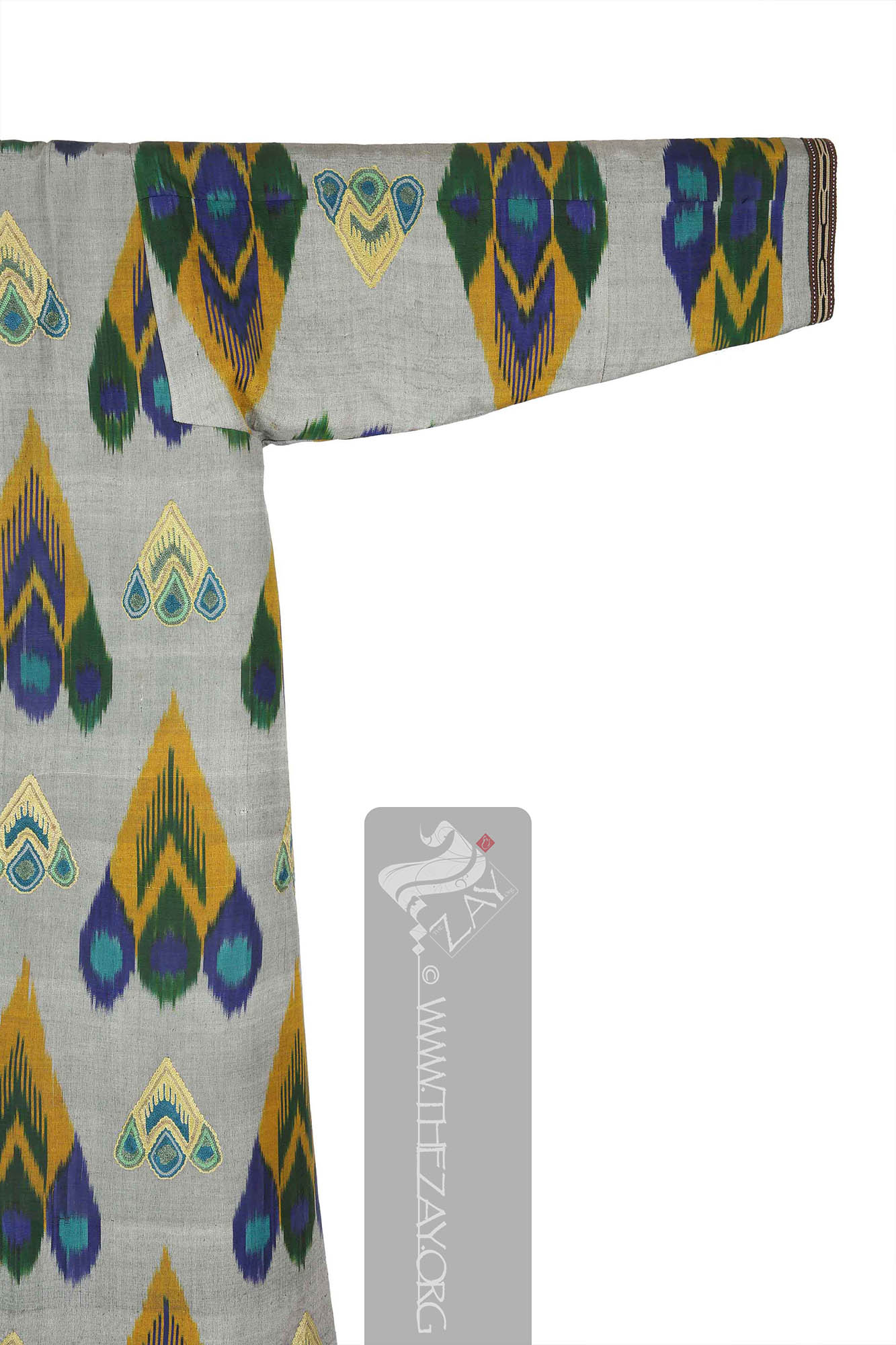
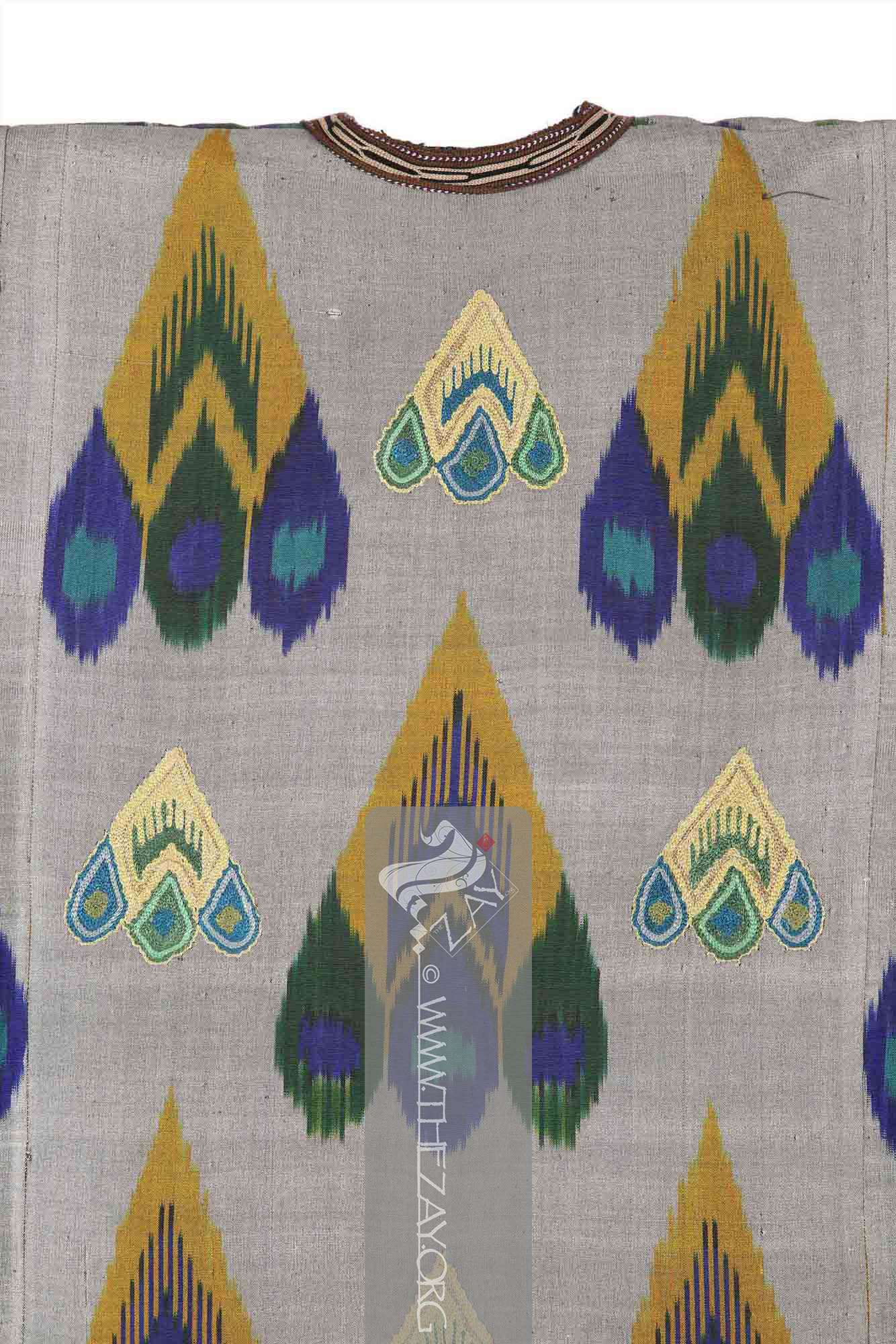
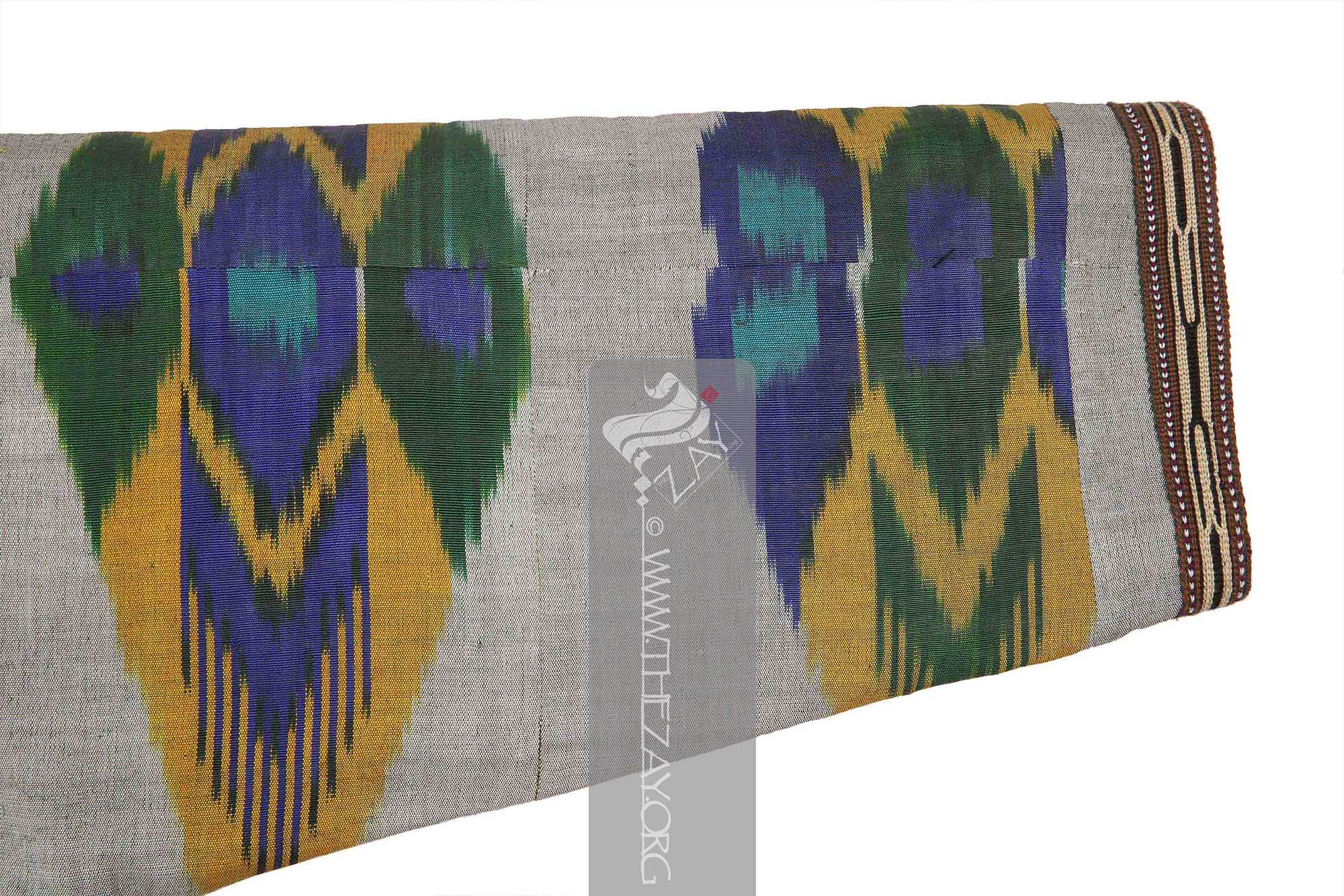
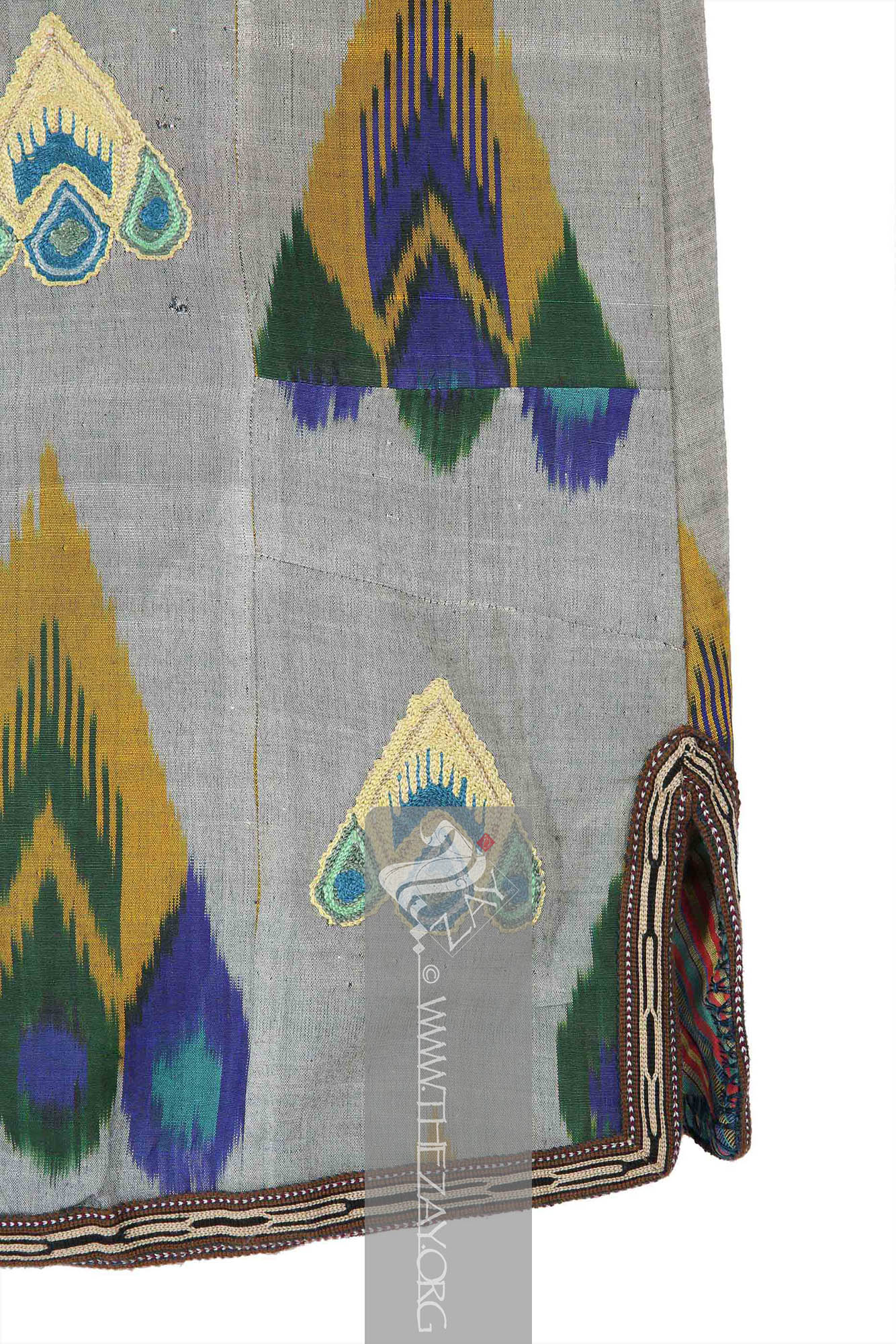
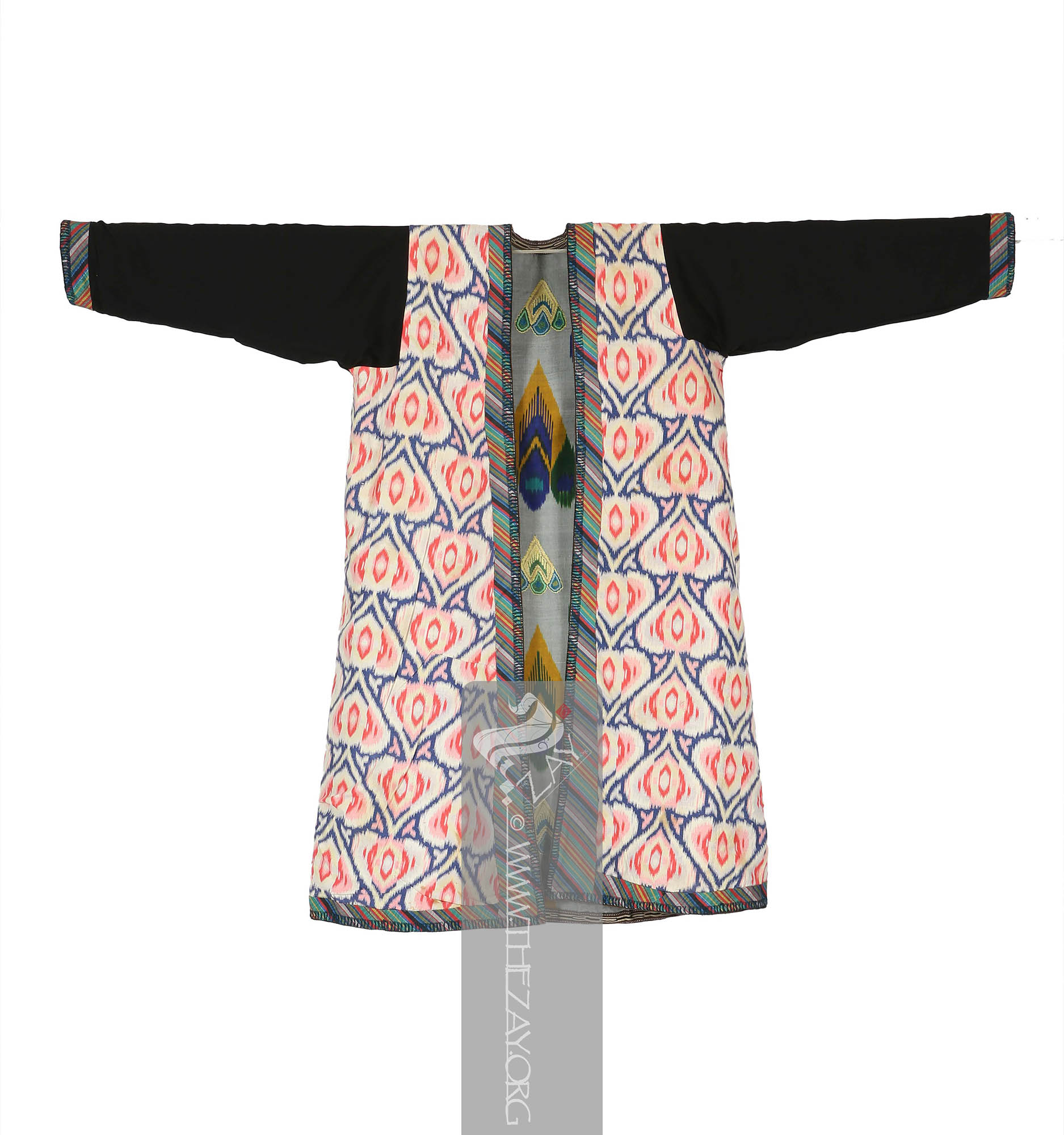
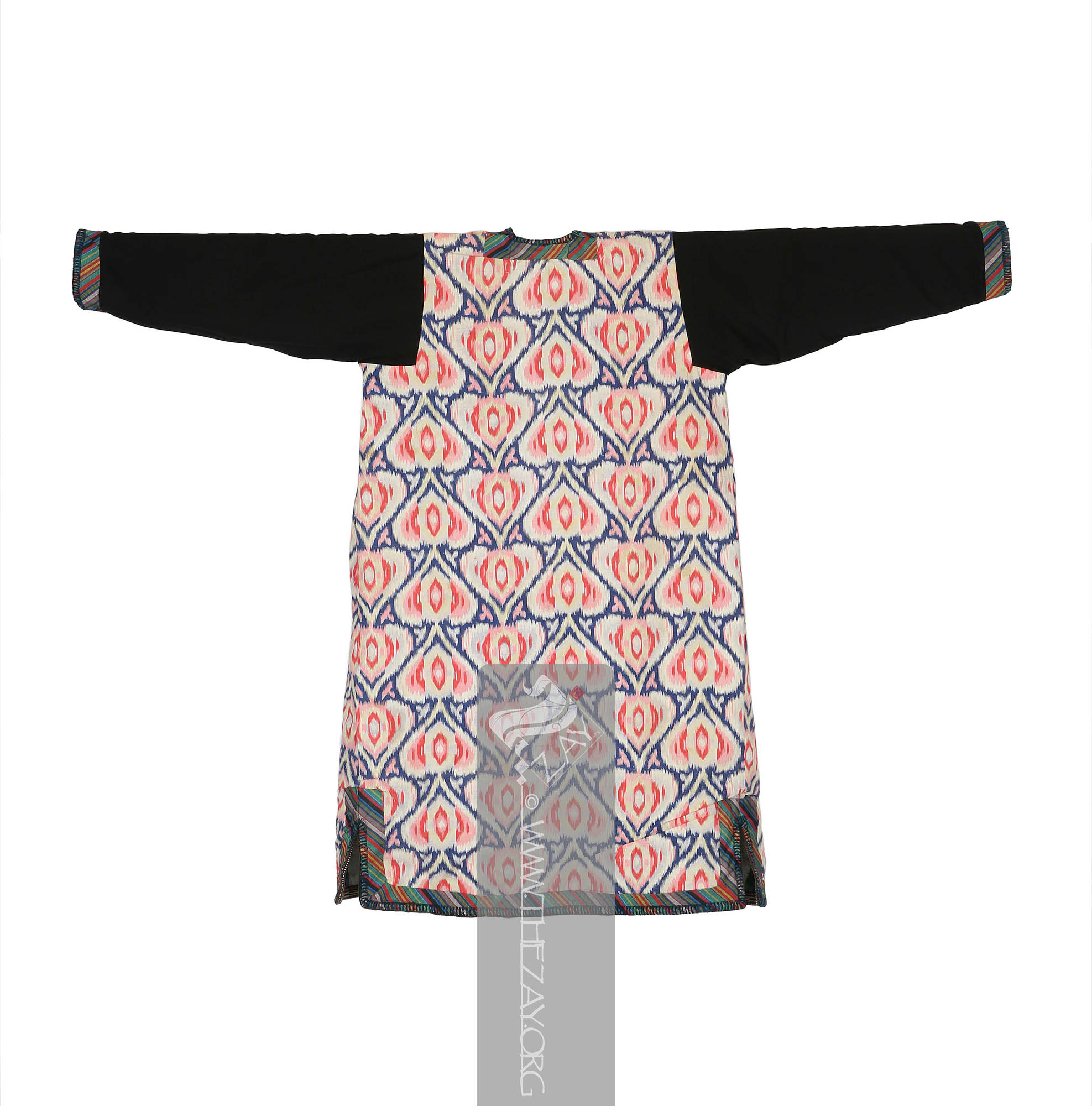
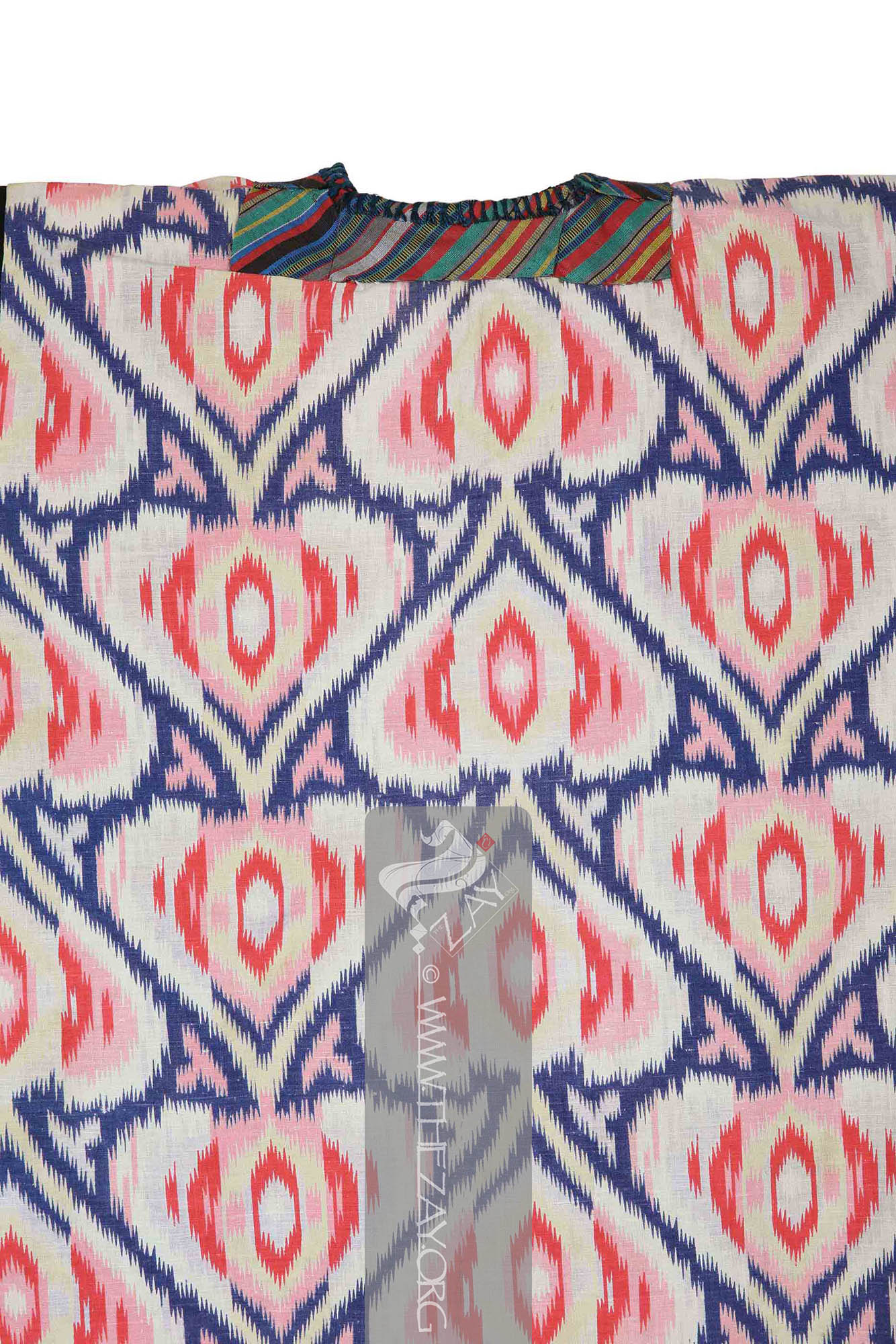
| Local Name | Khalat, Chapan |
| Object Category | Overgarment |
| Gender | Female |
| Place Of orgin | Asia |
| Region | Central Asia |
| Object Range | Uzbekistan, Turkmenistan, Tajikistan, Kazakhstan, Kyrgyzstan, Azerbaijan, Afghanistan, Iran, India, Pakistan, China, Russia, Turkey, Romania |
| Dimensions | Length: 120 cm Width: 165 cm |
| Materials | Linen |
| Technique | Dyed Hand Stitched Hand Embroidered Woven |
| Motif | Geometric Abstract |
| Provenance | Purchased, The Blue Souk, Sharjah 1996 |
| Location | The Zay Zay: (Arabic: costume, Pl. azyaā’), a set of clothes in a style typical of a particular country or historical period. Initiative |
| Status | In Storage |
| ZI number | ZI1996.500930 ASIA |
Ṭariq: (Arabic; Synonym: tulle_bi_talli
Tūlle_bi_tallī: (French: Tulle – a city in France where fine material for veil was first made; Turkish: tel – wire; Synonym: tariq; talli; badla; khus_dozi ), series of small metal knots made on a woven net ground as embellishment. The term is commonly used in the North African Arab region specifically in Egypt.
Aṭlas: (Latin: Atticus Atlas
Atlas: (Arabic and Aramaic: atlas – silk; from Greek: Atlas – Character from Greek mythology Synonym: adras, ikat
Ikat: (Indonesian and Malay: Chord, thread, bundle; Synonym: atlas, adras), is a resist dyeing technique that involves tying and dyeing yarns or threads before weaving, resulting in a distinct pattern. With strong traditions in Southeast Asia, Central Asia, the Indian subcontinent and Central America it probably originated independently around the world. , abr), a resist dyeing technique that involves tying and dyeing yarns or threads before weaving, resulting in a distinct pattern. With strong traditions sporadically across the globe it probably originated independently around the world. – a large silk producing moth; from Greek: Atlas
Atlas: (Arabic and Aramaic: atlas – silk; from Greek: Atlas – Character from Greek mythology Synonym: adras, ikat
Ikat: (Indonesian and Malay: Chord, thread, bundle; Synonym: atlas, adras), is a resist dyeing technique that involves tying and dyeing yarns or threads before weaving, resulting in a distinct pattern. With strong traditions in Southeast Asia, Central Asia, the Indian subcontinent and Central America it probably originated independently around the world. , abr), a resist dyeing technique that involves tying and dyeing yarns or threads before weaving, resulting in a distinct pattern. With strong traditions sporadically across the globe it probably originated independently around the world. – character from Greek mythology; Synonym: harir
Ḥarīr: (Arabic, Synonym: aṭlas), a common term for silk in the Arab world especially the Levant.
Aṭlas: (Latin: Atticus Atlas
Atlas: (Arabic and Aramaic: atlas – silk; from Greek: Atlas – Character from Greek mythology Synonym: adras, ikat
Ikat: (Indonesian and Malay: Chord, thread, bundle; Synonym: atlas, adras), is a resist dyeing technique that involves tying and dyeing yarns or threads before weaving, resulting in a distinct pattern. With strong traditions in Southeast Asia, Central Asia, the Indian subcontinent and Central America it probably originated independently around the world. , abr), a resist dyeing technique that involves tying and dyeing yarns or threads before weaving, resulting in a distinct pattern. With strong traditions sporadically across the globe it probably originated independently around the world. – a large silk producing moth; from Greek: Atlas
Atlas: (Arabic and Aramaic: atlas – silk; from Greek: Atlas – Character from Greek mythology Synonym: adras, ikat
Ikat: (Indonesian and Malay: Chord, thread, bundle; Synonym: atlas, adras), is a resist dyeing technique that involves tying and dyeing yarns or threads before weaving, resulting in a distinct pattern. With strong traditions in Southeast Asia, Central Asia, the Indian subcontinent and Central America it probably originated independently around the world. , abr), a resist dyeing technique that involves tying and dyeing yarns or threads before weaving, resulting in a distinct pattern. With strong traditions sporadically across the globe it probably originated independently around the world. – character from Greek mythology; Synonym: harir
Ḥarīr: (Arabic, Synonym: aṭlas), a common term for silk in the Arab world especially the Levant.
Aṭlas: (Latin: Atticus Atlas
Atlas: (Arabic and Aramaic: atlas – silk; from Greek: Atlas – Character from Greek mythology Synonym: adras, ikat
Ikat: (Indonesian and Malay: Chord, thread, bundle; Synonym: atlas, adras), is a resist dyeing technique that involves tying and dyeing yarns or threads before weaving, resulting in a distinct pattern. With strong traditions in Southeast Asia, Central Asia, the Indian subcontinent and Central America it probably originated independently around the world. , abr), a resist dyeing technique that involves tying and dyeing yarns or threads before weaving, resulting in a distinct pattern. With strong traditions sporadically across the globe it probably originated independently around the world. – a large silk producing moth; from Greek: Atlas
Atlas: (Arabic and Aramaic: atlas – silk; from Greek: Atlas – Character from Greek mythology Synonym: adras, ikat
Ikat: (Indonesian and Malay: Chord, thread, bundle; Synonym: atlas, adras), is a resist dyeing technique that involves tying and dyeing yarns or threads before weaving, resulting in a distinct pattern. With strong traditions in Southeast Asia, Central Asia, the Indian subcontinent and Central America it probably originated independently around the world. , abr), a resist dyeing technique that involves tying and dyeing yarns or threads before weaving, resulting in a distinct pattern. With strong traditions sporadically across the globe it probably originated independently around the world. – character from Greek mythology; Synonym: harir
Ḥarīr: (Arabic, Synonym: aṭlas), a common term for silk in the Arab world especially the Levant.
Chapan: (Persian: Chapān – old threadbare garement; or Chagatai: Chāpān, from Arabic: Jubba – Cloak; Synonym: Shapan
Shapan: (Persian: Chapān – old threadbare garment; or Chagatai: Chāpān, from Arabic: Jubba – Cloak; Synonym: Chapan), a type of traditional Central Asian robe or khalat with an open front, worn by both men and women. Usually made of silk, velvet, or cotton it is typically quilted or padded.
Aṭlas: (Latin: Atticus Atlas
Atlas: (Arabic and Aramaic: atlas – silk; from Greek: Atlas – Character from Greek mythology Synonym: adras, ikat
Ikat: (Indonesian and Malay: Chord, thread, bundle; Synonym: atlas, adras), is a resist dyeing technique that involves tying and dyeing yarns or threads before weaving, resulting in a distinct pattern. With strong traditions in Southeast Asia, Central Asia, the Indian subcontinent and Central America it probably originated independently around the world. , abr), a resist dyeing technique that involves tying and dyeing yarns or threads before weaving, resulting in a distinct pattern. With strong traditions sporadically across the globe it probably originated independently around the world. – a large silk producing moth; from Greek: Atlas
Atlas: (Arabic and Aramaic: atlas – silk; from Greek: Atlas – Character from Greek mythology Synonym: adras, ikat
Ikat: (Indonesian and Malay: Chord, thread, bundle; Synonym: atlas, adras), is a resist dyeing technique that involves tying and dyeing yarns or threads before weaving, resulting in a distinct pattern. With strong traditions in Southeast Asia, Central Asia, the Indian subcontinent and Central America it probably originated independently around the world. , abr), a resist dyeing technique that involves tying and dyeing yarns or threads before weaving, resulting in a distinct pattern. With strong traditions sporadically across the globe it probably originated independently around the world. – character from Greek mythology; Synonym: harir
Ḥarīr: (Arabic, Synonym: aṭlas), a common term for silk in the Arab world especially the Levant.
Aṭlas: (Latin: Atticus Atlas
Atlas: (Arabic and Aramaic: atlas – silk; from Greek: Atlas – Character from Greek mythology Synonym: adras, ikat
Ikat: (Indonesian and Malay: Chord, thread, bundle; Synonym: atlas, adras), is a resist dyeing technique that involves tying and dyeing yarns or threads before weaving, resulting in a distinct pattern. With strong traditions in Southeast Asia, Central Asia, the Indian subcontinent and Central America it probably originated independently around the world. , abr), a resist dyeing technique that involves tying and dyeing yarns or threads before weaving, resulting in a distinct pattern. With strong traditions sporadically across the globe it probably originated independently around the world. – a large silk producing moth; from Greek: Atlas
Atlas: (Arabic and Aramaic: atlas – silk; from Greek: Atlas – Character from Greek mythology Synonym: adras, ikat
Ikat: (Indonesian and Malay: Chord, thread, bundle; Synonym: atlas, adras), is a resist dyeing technique that involves tying and dyeing yarns or threads before weaving, resulting in a distinct pattern. With strong traditions in Southeast Asia, Central Asia, the Indian subcontinent and Central America it probably originated independently around the world. , abr), a resist dyeing technique that involves tying and dyeing yarns or threads before weaving, resulting in a distinct pattern. With strong traditions sporadically across the globe it probably originated independently around the world. – character from Greek mythology; Synonym: harir
Ḥarīr: (Arabic, Synonym: aṭlas), a common term for silk in the Arab world especially the Levant.
Aṭlas: (Latin: Atticus Atlas
Atlas: (Arabic and Aramaic: atlas – silk; from Greek: Atlas – Character from Greek mythology Synonym: adras, ikat
Ikat: (Indonesian and Malay: Chord, thread, bundle; Synonym: atlas, adras), is a resist dyeing technique that involves tying and dyeing yarns or threads before weaving, resulting in a distinct pattern. With strong traditions in Southeast Asia, Central Asia, the Indian subcontinent and Central America it probably originated independently around the world. , abr), a resist dyeing technique that involves tying and dyeing yarns or threads before weaving, resulting in a distinct pattern. With strong traditions sporadically across the globe it probably originated independently around the world. – a large silk producing moth; from Greek: Atlas
Atlas: (Arabic and Aramaic: atlas – silk; from Greek: Atlas – Character from Greek mythology Synonym: adras, ikat
Ikat: (Indonesian and Malay: Chord, thread, bundle; Synonym: atlas, adras), is a resist dyeing technique that involves tying and dyeing yarns or threads before weaving, resulting in a distinct pattern. With strong traditions in Southeast Asia, Central Asia, the Indian subcontinent and Central America it probably originated independently around the world. , abr), a resist dyeing technique that involves tying and dyeing yarns or threads before weaving, resulting in a distinct pattern. With strong traditions sporadically across the globe it probably originated independently around the world. – character from Greek mythology; Synonym: harir
Ḥarīr: (Arabic, Synonym: aṭlas), a common term for silk in the Arab world especially the Levant.
Chapan: (Persian: Chapān – old threadbare garement; or Chagatai: Chāpān, from Arabic: Jubba – Cloak; Synonym: Shapan
Shapan: (Persian: Chapān – old threadbare garment; or Chagatai: Chāpān, from Arabic: Jubba – Cloak; Synonym: Chapan), a type of traditional Central Asian robe or khalat with an open front, worn by both men and women. Usually made of silk, velvet, or cotton it is typically quilted or padded.
Chapan: (Persian: Chapān – old threadbare garement; or Chagatai: Chāpān, from Arabic: Jubba – Cloak; Synonym: Shapan
Shapan: (Persian: Chapān – old threadbare garment; or Chagatai: Chāpān, from Arabic: Jubba – Cloak; Synonym: Chapan), a type of traditional Central Asian robe or khalat with an open front, worn by both men and women. Usually made of silk, velvet, or cotton it is typically quilted or padded.
Aṭlas: (Latin: Atticus Atlas
Atlas: (Arabic and Aramaic: atlas – silk; from Greek: Atlas – Character from Greek mythology Synonym: adras, ikat
Ikat: (Indonesian and Malay: Chord, thread, bundle; Synonym: atlas, adras), is a resist dyeing technique that involves tying and dyeing yarns or threads before weaving, resulting in a distinct pattern. With strong traditions in Southeast Asia, Central Asia, the Indian subcontinent and Central America it probably originated independently around the world. , abr), a resist dyeing technique that involves tying and dyeing yarns or threads before weaving, resulting in a distinct pattern. With strong traditions sporadically across the globe it probably originated independently around the world. – a large silk producing moth; from Greek: Atlas
Atlas: (Arabic and Aramaic: atlas – silk; from Greek: Atlas – Character from Greek mythology Synonym: adras, ikat
Ikat: (Indonesian and Malay: Chord, thread, bundle; Synonym: atlas, adras), is a resist dyeing technique that involves tying and dyeing yarns or threads before weaving, resulting in a distinct pattern. With strong traditions in Southeast Asia, Central Asia, the Indian subcontinent and Central America it probably originated independently around the world. , abr), a resist dyeing technique that involves tying and dyeing yarns or threads before weaving, resulting in a distinct pattern. With strong traditions sporadically across the globe it probably originated independently around the world. – character from Greek mythology; Synonym: harir
Ḥarīr: (Arabic, Synonym: aṭlas), a common term for silk in the Arab world especially the Levant.
Aṭlas: (Latin: Atticus Atlas
Atlas: (Arabic and Aramaic: atlas – silk; from Greek: Atlas – Character from Greek mythology Synonym: adras, ikat
Ikat: (Indonesian and Malay: Chord, thread, bundle; Synonym: atlas, adras), is a resist dyeing technique that involves tying and dyeing yarns or threads before weaving, resulting in a distinct pattern. With strong traditions in Southeast Asia, Central Asia, the Indian subcontinent and Central America it probably originated independently around the world. , abr), a resist dyeing technique that involves tying and dyeing yarns or threads before weaving, resulting in a distinct pattern. With strong traditions sporadically across the globe it probably originated independently around the world. – a large silk producing moth; from Greek: Atlas
Atlas: (Arabic and Aramaic: atlas – silk; from Greek: Atlas – Character from Greek mythology Synonym: adras, ikat
Ikat: (Indonesian and Malay: Chord, thread, bundle; Synonym: atlas, adras), is a resist dyeing technique that involves tying and dyeing yarns or threads before weaving, resulting in a distinct pattern. With strong traditions in Southeast Asia, Central Asia, the Indian subcontinent and Central America it probably originated independently around the world. , abr), a resist dyeing technique that involves tying and dyeing yarns or threads before weaving, resulting in a distinct pattern. With strong traditions sporadically across the globe it probably originated independently around the world. – character from Greek mythology; Synonym: harir
Ḥarīr: (Arabic, Synonym: aṭlas), a common term for silk in the Arab world especially the Levant.
Aṭlas: (Latin: Atticus Atlas
Atlas: (Arabic and Aramaic: atlas – silk; from Greek: Atlas – Character from Greek mythology Synonym: adras, ikat
Ikat: (Indonesian and Malay: Chord, thread, bundle; Synonym: atlas, adras), is a resist dyeing technique that involves tying and dyeing yarns or threads before weaving, resulting in a distinct pattern. With strong traditions in Southeast Asia, Central Asia, the Indian subcontinent and Central America it probably originated independently around the world. , abr), a resist dyeing technique that involves tying and dyeing yarns or threads before weaving, resulting in a distinct pattern. With strong traditions sporadically across the globe it probably originated independently around the world. – a large silk producing moth; from Greek: Atlas
Atlas: (Arabic and Aramaic: atlas – silk; from Greek: Atlas – Character from Greek mythology Synonym: adras, ikat
Ikat: (Indonesian and Malay: Chord, thread, bundle; Synonym: atlas, adras), is a resist dyeing technique that involves tying and dyeing yarns or threads before weaving, resulting in a distinct pattern. With strong traditions in Southeast Asia, Central Asia, the Indian subcontinent and Central America it probably originated independently around the world. , abr), a resist dyeing technique that involves tying and dyeing yarns or threads before weaving, resulting in a distinct pattern. With strong traditions sporadically across the globe it probably originated independently around the world. – character from Greek mythology; Synonym: harir
Ḥarīr: (Arabic, Synonym: aṭlas), a common term for silk in the Arab world especially the Levant.
Chapan: (Persian: Chapān – old threadbare garement; or Chagatai: Chāpān, from Arabic: Jubba – Cloak; Synonym: Shapan
Shapan: (Persian: Chapān – old threadbare garment; or Chagatai: Chāpān, from Arabic: Jubba – Cloak; Synonym: Chapan), a type of traditional Central Asian robe or khalat with an open front, worn by both men and women. Usually made of silk, velvet, or cotton it is typically quilted or padded.
Aṭlas: (Latin: Atticus Atlas
Atlas: (Arabic and Aramaic: atlas – silk; from Greek: Atlas – Character from Greek mythology Synonym: adras, ikat
Ikat: (Indonesian and Malay: Chord, thread, bundle; Synonym: atlas, adras), is a resist dyeing technique that involves tying and dyeing yarns or threads before weaving, resulting in a distinct pattern. With strong traditions in Southeast Asia, Central Asia, the Indian subcontinent and Central America it probably originated independently around the world. , abr), a resist dyeing technique that involves tying and dyeing yarns or threads before weaving, resulting in a distinct pattern. With strong traditions sporadically across the globe it probably originated independently around the world. – a large silk producing moth; from Greek: Atlas
Atlas: (Arabic and Aramaic: atlas – silk; from Greek: Atlas – Character from Greek mythology Synonym: adras, ikat
Ikat: (Indonesian and Malay: Chord, thread, bundle; Synonym: atlas, adras), is a resist dyeing technique that involves tying and dyeing yarns or threads before weaving, resulting in a distinct pattern. With strong traditions in Southeast Asia, Central Asia, the Indian subcontinent and Central America it probably originated independently around the world. , abr), a resist dyeing technique that involves tying and dyeing yarns or threads before weaving, resulting in a distinct pattern. With strong traditions sporadically across the globe it probably originated independently around the world. – character from Greek mythology; Synonym: harir
Ḥarīr: (Arabic, Synonym: aṭlas), a common term for silk in the Arab world especially the Levant.
Aṭlas: (Latin: Atticus Atlas
Atlas: (Arabic and Aramaic: atlas – silk; from Greek: Atlas – Character from Greek mythology Synonym: adras, ikat
Ikat: (Indonesian and Malay: Chord, thread, bundle; Synonym: atlas, adras), is a resist dyeing technique that involves tying and dyeing yarns or threads before weaving, resulting in a distinct pattern. With strong traditions in Southeast Asia, Central Asia, the Indian subcontinent and Central America it probably originated independently around the world. , abr), a resist dyeing technique that involves tying and dyeing yarns or threads before weaving, resulting in a distinct pattern. With strong traditions sporadically across the globe it probably originated independently around the world. – a large silk producing moth; from Greek: Atlas
Atlas: (Arabic and Aramaic: atlas – silk; from Greek: Atlas – Character from Greek mythology Synonym: adras, ikat
Ikat: (Indonesian and Malay: Chord, thread, bundle; Synonym: atlas, adras), is a resist dyeing technique that involves tying and dyeing yarns or threads before weaving, resulting in a distinct pattern. With strong traditions in Southeast Asia, Central Asia, the Indian subcontinent and Central America it probably originated independently around the world. , abr), a resist dyeing technique that involves tying and dyeing yarns or threads before weaving, resulting in a distinct pattern. With strong traditions sporadically across the globe it probably originated independently around the world. – character from Greek mythology; Synonym: harir
Ḥarīr: (Arabic, Synonym: aṭlas), a common term for silk in the Arab world especially the Levant.
Aṭlas: (Latin: Atticus Atlas
Atlas: (Arabic and Aramaic: atlas – silk; from Greek: Atlas – Character from Greek mythology Synonym: adras, ikat
Ikat: (Indonesian and Malay: Chord, thread, bundle; Synonym: atlas, adras), is a resist dyeing technique that involves tying and dyeing yarns or threads before weaving, resulting in a distinct pattern. With strong traditions in Southeast Asia, Central Asia, the Indian subcontinent and Central America it probably originated independently around the world. , abr), a resist dyeing technique that involves tying and dyeing yarns or threads before weaving, resulting in a distinct pattern. With strong traditions sporadically across the globe it probably originated independently around the world. – a large silk producing moth; from Greek: Atlas
Atlas: (Arabic and Aramaic: atlas – silk; from Greek: Atlas – Character from Greek mythology Synonym: adras, ikat
Ikat: (Indonesian and Malay: Chord, thread, bundle; Synonym: atlas, adras), is a resist dyeing technique that involves tying and dyeing yarns or threads before weaving, resulting in a distinct pattern. With strong traditions in Southeast Asia, Central Asia, the Indian subcontinent and Central America it probably originated independently around the world. , abr), a resist dyeing technique that involves tying and dyeing yarns or threads before weaving, resulting in a distinct pattern. With strong traditions sporadically across the globe it probably originated independently around the world. – character from Greek mythology; Synonym: harir
Ḥarīr: (Arabic, Synonym: aṭlas), a common term for silk in the Arab world especially the Levant.
Aṭlas: (Latin: Atticus Atlas
Atlas: (Arabic and Aramaic: atlas – silk; from Greek: Atlas – Character from Greek mythology Synonym: adras, ikat
Ikat: (Indonesian and Malay: Chord, thread, bundle; Synonym: atlas, adras), is a resist dyeing technique that involves tying and dyeing yarns or threads before weaving, resulting in a distinct pattern. With strong traditions in Southeast Asia, Central Asia, the Indian subcontinent and Central America it probably originated independently around the world. , abr), a resist dyeing technique that involves tying and dyeing yarns or threads before weaving, resulting in a distinct pattern. With strong traditions sporadically across the globe it probably originated independently around the world. – a large silk producing moth; from Greek: Atlas
Atlas: (Arabic and Aramaic: atlas – silk; from Greek: Atlas – Character from Greek mythology Synonym: adras, ikat
Ikat: (Indonesian and Malay: Chord, thread, bundle; Synonym: atlas, adras), is a resist dyeing technique that involves tying and dyeing yarns or threads before weaving, resulting in a distinct pattern. With strong traditions in Southeast Asia, Central Asia, the Indian subcontinent and Central America it probably originated independently around the world. , abr), a resist dyeing technique that involves tying and dyeing yarns or threads before weaving, resulting in a distinct pattern. With strong traditions sporadically across the globe it probably originated independently around the world. – character from Greek mythology; Synonym: harir
Ḥarīr: (Arabic, Synonym: aṭlas), a common term for silk in the Arab world especially the Levant.
Aṭlas: (Latin: Atticus Atlas
Atlas: (Arabic and Aramaic: atlas – silk; from Greek: Atlas – Character from Greek mythology Synonym: adras, ikat
Ikat: (Indonesian and Malay: Chord, thread, bundle; Synonym: atlas, adras), is a resist dyeing technique that involves tying and dyeing yarns or threads before weaving, resulting in a distinct pattern. With strong traditions in Southeast Asia, Central Asia, the Indian subcontinent and Central America it probably originated independently around the world. , abr), a resist dyeing technique that involves tying and dyeing yarns or threads before weaving, resulting in a distinct pattern. With strong traditions sporadically across the globe it probably originated independently around the world. – a large silk producing moth; from Greek: Atlas
Atlas: (Arabic and Aramaic: atlas – silk; from Greek: Atlas – Character from Greek mythology Synonym: adras, ikat
Ikat: (Indonesian and Malay: Chord, thread, bundle; Synonym: atlas, adras), is a resist dyeing technique that involves tying and dyeing yarns or threads before weaving, resulting in a distinct pattern. With strong traditions in Southeast Asia, Central Asia, the Indian subcontinent and Central America it probably originated independently around the world. , abr), a resist dyeing technique that involves tying and dyeing yarns or threads before weaving, resulting in a distinct pattern. With strong traditions sporadically across the globe it probably originated independently around the world. – character from Greek mythology; Synonym: harir
Ḥarīr: (Arabic, Synonym: aṭlas), a common term for silk in the Arab world especially the Levant.
Aṭlas: (Latin: Atticus Atlas
Atlas: (Arabic and Aramaic: atlas – silk; from Greek: Atlas – Character from Greek mythology Synonym: adras, ikat
Ikat: (Indonesian and Malay: Chord, thread, bundle; Synonym: atlas, adras), is a resist dyeing technique that involves tying and dyeing yarns or threads before weaving, resulting in a distinct pattern. With strong traditions in Southeast Asia, Central Asia, the Indian subcontinent and Central America it probably originated independently around the world. , abr), a resist dyeing technique that involves tying and dyeing yarns or threads before weaving, resulting in a distinct pattern. With strong traditions sporadically across the globe it probably originated independently around the world. – a large silk producing moth; from Greek: Atlas
Atlas: (Arabic and Aramaic: atlas – silk; from Greek: Atlas – Character from Greek mythology Synonym: adras, ikat
Ikat: (Indonesian and Malay: Chord, thread, bundle; Synonym: atlas, adras), is a resist dyeing technique that involves tying and dyeing yarns or threads before weaving, resulting in a distinct pattern. With strong traditions in Southeast Asia, Central Asia, the Indian subcontinent and Central America it probably originated independently around the world. , abr), a resist dyeing technique that involves tying and dyeing yarns or threads before weaving, resulting in a distinct pattern. With strong traditions sporadically across the globe it probably originated independently around the world. – character from Greek mythology; Synonym: harir
Ḥarīr: (Arabic, Synonym: aṭlas), a common term for silk in the Arab world especially the Levant.
Aṭlas: (Latin: Atticus Atlas
Atlas: (Arabic and Aramaic: atlas – silk; from Greek: Atlas – Character from Greek mythology Synonym: adras, ikat
Ikat: (Indonesian and Malay: Chord, thread, bundle; Synonym: atlas, adras), is a resist dyeing technique that involves tying and dyeing yarns or threads before weaving, resulting in a distinct pattern. With strong traditions in Southeast Asia, Central Asia, the Indian subcontinent and Central America it probably originated independently around the world. , abr), a resist dyeing technique that involves tying and dyeing yarns or threads before weaving, resulting in a distinct pattern. With strong traditions sporadically across the globe it probably originated independently around the world. – a large silk producing moth; from Greek: Atlas
Atlas: (Arabic and Aramaic: atlas – silk; from Greek: Atlas – Character from Greek mythology Synonym: adras, ikat
Ikat: (Indonesian and Malay: Chord, thread, bundle; Synonym: atlas, adras), is a resist dyeing technique that involves tying and dyeing yarns or threads before weaving, resulting in a distinct pattern. With strong traditions in Southeast Asia, Central Asia, the Indian subcontinent and Central America it probably originated independently around the world. , abr), a resist dyeing technique that involves tying and dyeing yarns or threads before weaving, resulting in a distinct pattern. With strong traditions sporadically across the globe it probably originated independently around the world. – character from Greek mythology; Synonym: harir
Ḥarīr: (Arabic, Synonym: aṭlas), a common term for silk in the Arab world especially the Levant.
Aṭlas: (Latin: Atticus Atlas
Atlas: (Arabic and Aramaic: atlas – silk; from Greek: Atlas – Character from Greek mythology Synonym: adras, ikat
Ikat: (Indonesian and Malay: Chord, thread, bundle; Synonym: atlas, adras), is a resist dyeing technique that involves tying and dyeing yarns or threads before weaving, resulting in a distinct pattern. With strong traditions in Southeast Asia, Central Asia, the Indian subcontinent and Central America it probably originated independently around the world. , abr), a resist dyeing technique that involves tying and dyeing yarns or threads before weaving, resulting in a distinct pattern. With strong traditions sporadically across the globe it probably originated independently around the world. – a large silk producing moth; from Greek: Atlas
Atlas: (Arabic and Aramaic: atlas – silk; from Greek: Atlas – Character from Greek mythology Synonym: adras, ikat
Ikat: (Indonesian and Malay: Chord, thread, bundle; Synonym: atlas, adras), is a resist dyeing technique that involves tying and dyeing yarns or threads before weaving, resulting in a distinct pattern. With strong traditions in Southeast Asia, Central Asia, the Indian subcontinent and Central America it probably originated independently around the world. , abr), a resist dyeing technique that involves tying and dyeing yarns or threads before weaving, resulting in a distinct pattern. With strong traditions sporadically across the globe it probably originated independently around the world. – character from Greek mythology; Synonym: harir
Ḥarīr: (Arabic, Synonym: aṭlas), a common term for silk in the Arab world especially the Levant.
Aṭlas: (Latin: Atticus Atlas
Atlas: (Arabic and Aramaic: atlas – silk; from Greek: Atlas – Character from Greek mythology Synonym: adras, ikat
Ikat: (Indonesian and Malay: Chord, thread, bundle; Synonym: atlas, adras), is a resist dyeing technique that involves tying and dyeing yarns or threads before weaving, resulting in a distinct pattern. With strong traditions in Southeast Asia, Central Asia, the Indian subcontinent and Central America it probably originated independently around the world. , abr), a resist dyeing technique that involves tying and dyeing yarns or threads before weaving, resulting in a distinct pattern. With strong traditions sporadically across the globe it probably originated independently around the world. – a large silk producing moth; from Greek: Atlas
Atlas: (Arabic and Aramaic: atlas – silk; from Greek: Atlas – Character from Greek mythology Synonym: adras, ikat
Ikat: (Indonesian and Malay: Chord, thread, bundle; Synonym: atlas, adras), is a resist dyeing technique that involves tying and dyeing yarns or threads before weaving, resulting in a distinct pattern. With strong traditions in Southeast Asia, Central Asia, the Indian subcontinent and Central America it probably originated independently around the world. , abr), a resist dyeing technique that involves tying and dyeing yarns or threads before weaving, resulting in a distinct pattern. With strong traditions sporadically across the globe it probably originated independently around the world. – character from Greek mythology; Synonym: harir
Ḥarīr: (Arabic, Synonym: aṭlas), a common term for silk in the Arab world especially the Levant.
Aṭlas: (Latin: Atticus Atlas
Atlas: (Arabic and Aramaic: atlas – silk; from Greek: Atlas – Character from Greek mythology Synonym: adras, ikat
Ikat: (Indonesian and Malay: Chord, thread, bundle; Synonym: atlas, adras), is a resist dyeing technique that involves tying and dyeing yarns or threads before weaving, resulting in a distinct pattern. With strong traditions in Southeast Asia, Central Asia, the Indian subcontinent and Central America it probably originated independently around the world. , abr), a resist dyeing technique that involves tying and dyeing yarns or threads before weaving, resulting in a distinct pattern. With strong traditions sporadically across the globe it probably originated independently around the world. – a large silk producing moth; from Greek: Atlas
Atlas: (Arabic and Aramaic: atlas – silk; from Greek: Atlas – Character from Greek mythology Synonym: adras, ikat
Ikat: (Indonesian and Malay: Chord, thread, bundle; Synonym: atlas, adras), is a resist dyeing technique that involves tying and dyeing yarns or threads before weaving, resulting in a distinct pattern. With strong traditions in Southeast Asia, Central Asia, the Indian subcontinent and Central America it probably originated independently around the world. , abr), a resist dyeing technique that involves tying and dyeing yarns or threads before weaving, resulting in a distinct pattern. With strong traditions sporadically across the globe it probably originated independently around the world. – character from Greek mythology; Synonym: harir
Ḥarīr: (Arabic, Synonym: aṭlas), a common term for silk in the Arab world especially the Levant.
Aṭlas: (Latin: Atticus Atlas
Atlas: (Arabic and Aramaic: atlas – silk; from Greek: Atlas – Character from Greek mythology Synonym: adras, ikat
Ikat: (Indonesian and Malay: Chord, thread, bundle; Synonym: atlas, adras), is a resist dyeing technique that involves tying and dyeing yarns or threads before weaving, resulting in a distinct pattern. With strong traditions in Southeast Asia, Central Asia, the Indian subcontinent and Central America it probably originated independently around the world. , abr), a resist dyeing technique that involves tying and dyeing yarns or threads before weaving, resulting in a distinct pattern. With strong traditions sporadically across the globe it probably originated independently around the world. – a large silk producing moth; from Greek: Atlas
Atlas: (Arabic and Aramaic: atlas – silk; from Greek: Atlas – Character from Greek mythology Synonym: adras, ikat
Ikat: (Indonesian and Malay: Chord, thread, bundle; Synonym: atlas, adras), is a resist dyeing technique that involves tying and dyeing yarns or threads before weaving, resulting in a distinct pattern. With strong traditions in Southeast Asia, Central Asia, the Indian subcontinent and Central America it probably originated independently around the world. , abr), a resist dyeing technique that involves tying and dyeing yarns or threads before weaving, resulting in a distinct pattern. With strong traditions sporadically across the globe it probably originated independently around the world. – character from Greek mythology; Synonym: harir
Ḥarīr: (Arabic, Synonym: aṭlas), a common term for silk in the Arab world especially the Levant.
Aṭlas: (Latin: Atticus Atlas
Atlas: (Arabic and Aramaic: atlas – silk; from Greek: Atlas – Character from Greek mythology Synonym: adras, ikat
Ikat: (Indonesian and Malay: Chord, thread, bundle; Synonym: atlas, adras), is a resist dyeing technique that involves tying and dyeing yarns or threads before weaving, resulting in a distinct pattern. With strong traditions in Southeast Asia, Central Asia, the Indian subcontinent and Central America it probably originated independently around the world. , abr), a resist dyeing technique that involves tying and dyeing yarns or threads before weaving, resulting in a distinct pattern. With strong traditions sporadically across the globe it probably originated independently around the world. – a large silk producing moth; from Greek: Atlas
Atlas: (Arabic and Aramaic: atlas – silk; from Greek: Atlas – Character from Greek mythology Synonym: adras, ikat
Ikat: (Indonesian and Malay: Chord, thread, bundle; Synonym: atlas, adras), is a resist dyeing technique that involves tying and dyeing yarns or threads before weaving, resulting in a distinct pattern. With strong traditions in Southeast Asia, Central Asia, the Indian subcontinent and Central America it probably originated independently around the world. , abr), a resist dyeing technique that involves tying and dyeing yarns or threads before weaving, resulting in a distinct pattern. With strong traditions sporadically across the globe it probably originated independently around the world. – character from Greek mythology; Synonym: harir
Ḥarīr: (Arabic, Synonym: aṭlas), a common term for silk in the Arab world especially the Levant.
Aṭlas: (Latin: Atticus Atlas
Atlas: (Arabic and Aramaic: atlas – silk; from Greek: Atlas – Character from Greek mythology Synonym: adras, ikat
Ikat: (Indonesian and Malay: Chord, thread, bundle; Synonym: atlas, adras), is a resist dyeing technique that involves tying and dyeing yarns or threads before weaving, resulting in a distinct pattern. With strong traditions in Southeast Asia, Central Asia, the Indian subcontinent and Central America it probably originated independently around the world. , abr), a resist dyeing technique that involves tying and dyeing yarns or threads before weaving, resulting in a distinct pattern. With strong traditions sporadically across the globe it probably originated independently around the world. – a large silk producing moth; from Greek: Atlas
Atlas: (Arabic and Aramaic: atlas – silk; from Greek: Atlas – Character from Greek mythology Synonym: adras, ikat
Ikat: (Indonesian and Malay: Chord, thread, bundle; Synonym: atlas, adras), is a resist dyeing technique that involves tying and dyeing yarns or threads before weaving, resulting in a distinct pattern. With strong traditions in Southeast Asia, Central Asia, the Indian subcontinent and Central America it probably originated independently around the world. , abr), a resist dyeing technique that involves tying and dyeing yarns or threads before weaving, resulting in a distinct pattern. With strong traditions sporadically across the globe it probably originated independently around the world. – character from Greek mythology; Synonym: harir
Ḥarīr: (Arabic, Synonym: aṭlas), a common term for silk in the Arab world especially the Levant.
Aṭlas: (Latin: Atticus Atlas
Atlas: (Arabic and Aramaic: atlas – silk; from Greek: Atlas – Character from Greek mythology Synonym: adras, ikat
Ikat: (Indonesian and Malay: Chord, thread, bundle; Synonym: atlas, adras), is a resist dyeing technique that involves tying and dyeing yarns or threads before weaving, resulting in a distinct pattern. With strong traditions in Southeast Asia, Central Asia, the Indian subcontinent and Central America it probably originated independently around the world. , abr), a resist dyeing technique that involves tying and dyeing yarns or threads before weaving, resulting in a distinct pattern. With strong traditions sporadically across the globe it probably originated independently around the world. – a large silk producing moth; from Greek: Atlas
Atlas: (Arabic and Aramaic: atlas – silk; from Greek: Atlas – Character from Greek mythology Synonym: adras, ikat
Ikat: (Indonesian and Malay: Chord, thread, bundle; Synonym: atlas, adras), is a resist dyeing technique that involves tying and dyeing yarns or threads before weaving, resulting in a distinct pattern. With strong traditions in Southeast Asia, Central Asia, the Indian subcontinent and Central America it probably originated independently around the world. , abr), a resist dyeing technique that involves tying and dyeing yarns or threads before weaving, resulting in a distinct pattern. With strong traditions sporadically across the globe it probably originated independently around the world. – character from Greek mythology; Synonym: harir
Ḥarīr: (Arabic, Synonym: aṭlas), a common term for silk in the Arab world especially the Levant.
Aṭlas: (Latin: Atticus Atlas
Atlas: (Arabic and Aramaic: atlas – silk; from Greek: Atlas – Character from Greek mythology Synonym: adras, ikat
Ikat: (Indonesian and Malay: Chord, thread, bundle; Synonym: atlas, adras), is a resist dyeing technique that involves tying and dyeing yarns or threads before weaving, resulting in a distinct pattern. With strong traditions in Southeast Asia, Central Asia, the Indian subcontinent and Central America it probably originated independently around the world. , abr), a resist dyeing technique that involves tying and dyeing yarns or threads before weaving, resulting in a distinct pattern. With strong traditions sporadically across the globe it probably originated independently around the world. – a large silk producing moth; from Greek: Atlas
Atlas: (Arabic and Aramaic: atlas – silk; from Greek: Atlas – Character from Greek mythology Synonym: adras, ikat
Ikat: (Indonesian and Malay: Chord, thread, bundle; Synonym: atlas, adras), is a resist dyeing technique that involves tying and dyeing yarns or threads before weaving, resulting in a distinct pattern. With strong traditions in Southeast Asia, Central Asia, the Indian subcontinent and Central America it probably originated independently around the world. , abr), a resist dyeing technique that involves tying and dyeing yarns or threads before weaving, resulting in a distinct pattern. With strong traditions sporadically across the globe it probably originated independently around the world. – character from Greek mythology; Synonym: harir
Ḥarīr: (Arabic, Synonym: aṭlas), a common term for silk in the Arab world especially the Levant.
Aṭlas: (Latin: Atticus Atlas
Atlas: (Arabic and Aramaic: atlas – silk; from Greek: Atlas – Character from Greek mythology Synonym: adras, ikat
Ikat: (Indonesian and Malay: Chord, thread, bundle; Synonym: atlas, adras), is a resist dyeing technique that involves tying and dyeing yarns or threads before weaving, resulting in a distinct pattern. With strong traditions in Southeast Asia, Central Asia, the Indian subcontinent and Central America it probably originated independently around the world. , abr), a resist dyeing technique that involves tying and dyeing yarns or threads before weaving, resulting in a distinct pattern. With strong traditions sporadically across the globe it probably originated independently around the world. – a large silk producing moth; from Greek: Atlas
Atlas: (Arabic and Aramaic: atlas – silk; from Greek: Atlas – Character from Greek mythology Synonym: adras, ikat
Ikat: (Indonesian and Malay: Chord, thread, bundle; Synonym: atlas, adras), is a resist dyeing technique that involves tying and dyeing yarns or threads before weaving, resulting in a distinct pattern. With strong traditions in Southeast Asia, Central Asia, the Indian subcontinent and Central America it probably originated independently around the world. , abr), a resist dyeing technique that involves tying and dyeing yarns or threads before weaving, resulting in a distinct pattern. With strong traditions sporadically across the globe it probably originated independently around the world. – character from Greek mythology; Synonym: harir
Ḥarīr: (Arabic, Synonym: aṭlas), a common term for silk in the Arab world especially the Levant.
Aṭlas: (Latin: Atticus Atlas
Atlas: (Arabic and Aramaic: atlas – silk; from Greek: Atlas – Character from Greek mythology Synonym: adras, ikat
Ikat: (Indonesian and Malay: Chord, thread, bundle; Synonym: atlas, adras), is a resist dyeing technique that involves tying and dyeing yarns or threads before weaving, resulting in a distinct pattern. With strong traditions in Southeast Asia, Central Asia, the Indian subcontinent and Central America it probably originated independently around the world. , abr), a resist dyeing technique that involves tying and dyeing yarns or threads before weaving, resulting in a distinct pattern. With strong traditions sporadically across the globe it probably originated independently around the world. – a large silk producing moth; from Greek: Atlas
Atlas: (Arabic and Aramaic: atlas – silk; from Greek: Atlas – Character from Greek mythology Synonym: adras, ikat
Ikat: (Indonesian and Malay: Chord, thread, bundle; Synonym: atlas, adras), is a resist dyeing technique that involves tying and dyeing yarns or threads before weaving, resulting in a distinct pattern. With strong traditions in Southeast Asia, Central Asia, the Indian subcontinent and Central America it probably originated independently around the world. , abr), a resist dyeing technique that involves tying and dyeing yarns or threads before weaving, resulting in a distinct pattern. With strong traditions sporadically across the globe it probably originated independently around the world. – character from Greek mythology; Synonym: harir
Ḥarīr: (Arabic, Synonym: aṭlas), a common term for silk in the Arab world especially the Levant.
Aṭlas: (Latin: Atticus Atlas
Atlas: (Arabic and Aramaic: atlas – silk; from Greek: Atlas – Character from Greek mythology Synonym: adras, ikat
Ikat: (Indonesian and Malay: Chord, thread, bundle; Synonym: atlas, adras), is a resist dyeing technique that involves tying and dyeing yarns or threads before weaving, resulting in a distinct pattern. With strong traditions in Southeast Asia, Central Asia, the Indian subcontinent and Central America it probably originated independently around the world. , abr), a resist dyeing technique that involves tying and dyeing yarns or threads before weaving, resulting in a distinct pattern. With strong traditions sporadically across the globe it probably originated independently around the world. – a large silk producing moth; from Greek: Atlas
Atlas: (Arabic and Aramaic: atlas – silk; from Greek: Atlas – Character from Greek mythology Synonym: adras, ikat
Ikat: (Indonesian and Malay: Chord, thread, bundle; Synonym: atlas, adras), is a resist dyeing technique that involves tying and dyeing yarns or threads before weaving, resulting in a distinct pattern. With strong traditions in Southeast Asia, Central Asia, the Indian subcontinent and Central America it probably originated independently around the world. , abr), a resist dyeing technique that involves tying and dyeing yarns or threads before weaving, resulting in a distinct pattern. With strong traditions sporadically across the globe it probably originated independently around the world. – character from Greek mythology; Synonym: harir
Ḥarīr: (Arabic, Synonym: aṭlas), a common term for silk in the Arab world especially the Levant.
Aṭlas: (Latin: Atticus Atlas
Atlas: (Arabic and Aramaic: atlas – silk; from Greek: Atlas – Character from Greek mythology Synonym: adras, ikat
Ikat: (Indonesian and Malay: Chord, thread, bundle; Synonym: atlas, adras), is a resist dyeing technique that involves tying and dyeing yarns or threads before weaving, resulting in a distinct pattern. With strong traditions in Southeast Asia, Central Asia, the Indian subcontinent and Central America it probably originated independently around the world. , abr), a resist dyeing technique that involves tying and dyeing yarns or threads before weaving, resulting in a distinct pattern. With strong traditions sporadically across the globe it probably originated independently around the world. – a large silk producing moth; from Greek: Atlas
Atlas: (Arabic and Aramaic: atlas – silk; from Greek: Atlas – Character from Greek mythology Synonym: adras, ikat
Ikat: (Indonesian and Malay: Chord, thread, bundle; Synonym: atlas, adras), is a resist dyeing technique that involves tying and dyeing yarns or threads before weaving, resulting in a distinct pattern. With strong traditions in Southeast Asia, Central Asia, the Indian subcontinent and Central America it probably originated independently around the world. , abr), a resist dyeing technique that involves tying and dyeing yarns or threads before weaving, resulting in a distinct pattern. With strong traditions sporadically across the globe it probably originated independently around the world. – character from Greek mythology; Synonym: harir
Ḥarīr: (Arabic, Synonym: aṭlas), a common term for silk in the Arab world especially the Levant.
Aṭlas: (Latin: Atticus Atlas
Atlas: (Arabic and Aramaic: atlas – silk; from Greek: Atlas – Character from Greek mythology Synonym: adras, ikat
Ikat: (Indonesian and Malay: Chord, thread, bundle; Synonym: atlas, adras), is a resist dyeing technique that involves tying and dyeing yarns or threads before weaving, resulting in a distinct pattern. With strong traditions in Southeast Asia, Central Asia, the Indian subcontinent and Central America it probably originated independently around the world. , abr), a resist dyeing technique that involves tying and dyeing yarns or threads before weaving, resulting in a distinct pattern. With strong traditions sporadically across the globe it probably originated independently around the world. – a large silk producing moth; from Greek: Atlas
Atlas: (Arabic and Aramaic: atlas – silk; from Greek: Atlas – Character from Greek mythology Synonym: adras, ikat
Ikat: (Indonesian and Malay: Chord, thread, bundle; Synonym: atlas, adras), is a resist dyeing technique that involves tying and dyeing yarns or threads before weaving, resulting in a distinct pattern. With strong traditions in Southeast Asia, Central Asia, the Indian subcontinent and Central America it probably originated independently around the world. , abr), a resist dyeing technique that involves tying and dyeing yarns or threads before weaving, resulting in a distinct pattern. With strong traditions sporadically across the globe it probably originated independently around the world. – character from Greek mythology; Synonym: harir
Ḥarīr: (Arabic, Synonym: aṭlas), a common term for silk in the Arab world especially the Levant.
Aṭlas: (Latin: Atticus Atlas
Atlas: (Arabic and Aramaic: atlas – silk; from Greek: Atlas – Character from Greek mythology Synonym: adras, ikat
Ikat: (Indonesian and Malay: Chord, thread, bundle; Synonym: atlas, adras), is a resist dyeing technique that involves tying and dyeing yarns or threads before weaving, resulting in a distinct pattern. With strong traditions in Southeast Asia, Central Asia, the Indian subcontinent and Central America it probably originated independently around the world. , abr), a resist dyeing technique that involves tying and dyeing yarns or threads before weaving, resulting in a distinct pattern. With strong traditions sporadically across the globe it probably originated independently around the world. – a large silk producing moth; from Greek: Atlas
Atlas: (Arabic and Aramaic: atlas – silk; from Greek: Atlas – Character from Greek mythology Synonym: adras, ikat
Ikat: (Indonesian and Malay: Chord, thread, bundle; Synonym: atlas, adras), is a resist dyeing technique that involves tying and dyeing yarns or threads before weaving, resulting in a distinct pattern. With strong traditions in Southeast Asia, Central Asia, the Indian subcontinent and Central America it probably originated independently around the world. , abr), a resist dyeing technique that involves tying and dyeing yarns or threads before weaving, resulting in a distinct pattern. With strong traditions sporadically across the globe it probably originated independently around the world. – character from Greek mythology; Synonym: harir
Ḥarīr: (Arabic, Synonym: aṭlas), a common term for silk in the Arab world especially the Levant.